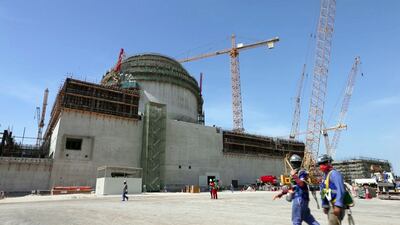The UAE has announced that construction of Unit 3 of the Barakah Nuclear Energy Plant is complete.
The unit has been handed over for readiness checks and is set to be up and running in 2023.
The announcement was made on the sidelines of Cop26 in Glasgow, to demonstrate the UAE's transition to cleaner energy sources, while cutting carbon emissions and increasing the power supply to meet the growing demand for electricity.
The Arab world's first multi-unit operating nuclear energy plant is located in the Al Dhafra region of Abu Dhabi. Unit 1 is already fully operational and Unit 2 was recently connected to the main grid and continues to undergo testing.
Enec
The UAE's bid to host Cop28 in 2023 has been endorsed by member states of the UN's Asia Pacific group and the country continues to demonstrate commitment to the 2050 Net Zero initiative.
By 2025 it is projected that the Barakah plant will have cut the emirate's carbon emissions by 50 per cent.
Unit 3 will now be subjected to testing, regulatory inspections and international assessments required to obtain the Operating Licence for Unit 3 from the UAE’s independent nuclear regulator, the Federal Authority for Nuclear Regulation (FANR).

"With Unit 1 already commercially operating and Unit 2 recently connected to the UAE grid, Unit 3 construction completion demonstrates the steady progress we are making with the development of the Barakah Nuclear Energy Plant," said Mohamed Al Hammadi, chief executive of Emirates Nuclear Energy Corporation (Enec).
"As the world gathers at Cop26 in Glasgow, Scotland, the need for concrete action to tackle climate change is indisputable and urgent.
"The Barakah Plant, with its rapid decarbonisation of the power sector, is delivering climate solutions today and with Unit 3 construction now complete, we are progressing smoothly towards supplying a quarter of the UAE’s electricity needs completely carbon-free."
Unit 3 of the Barakah Plant has already successfully completed a number of individual and combined system tests, including Cold Hydrostatic Testing, the Structural Integrity Test, and Integrated Leak Rate Test and the Hot Functional Test as part of the first phase of its Initial Testing Program. The ITP aims to ensure that the unit’s systems operate in accordance with the highest industry standards and will continue to do so during the operation of the plant over the coming decades.
The Barakah Plant is one of the largest nuclear energy plants in the world, with four APR-1400 units. Construction began in 2012 and has progressed steadily. The development is now more than 96 per cent complete. When fully operational, the plant will produce 5.6 gigawatts of carbon-free electricity for more than 60 years.
“By developing nuclear energy in the UAE, Enec is enabling sustainable growth and prosperity for the nation through the provision of abundant, 24/7 clean electricity, whilst underpinning intermittent renewables and creating a bridge to other clean energy technologies like green hydrogen," said Mr Al Hammadi.
"We are tackling climate change directly today and will do for the next 60 years to come."












